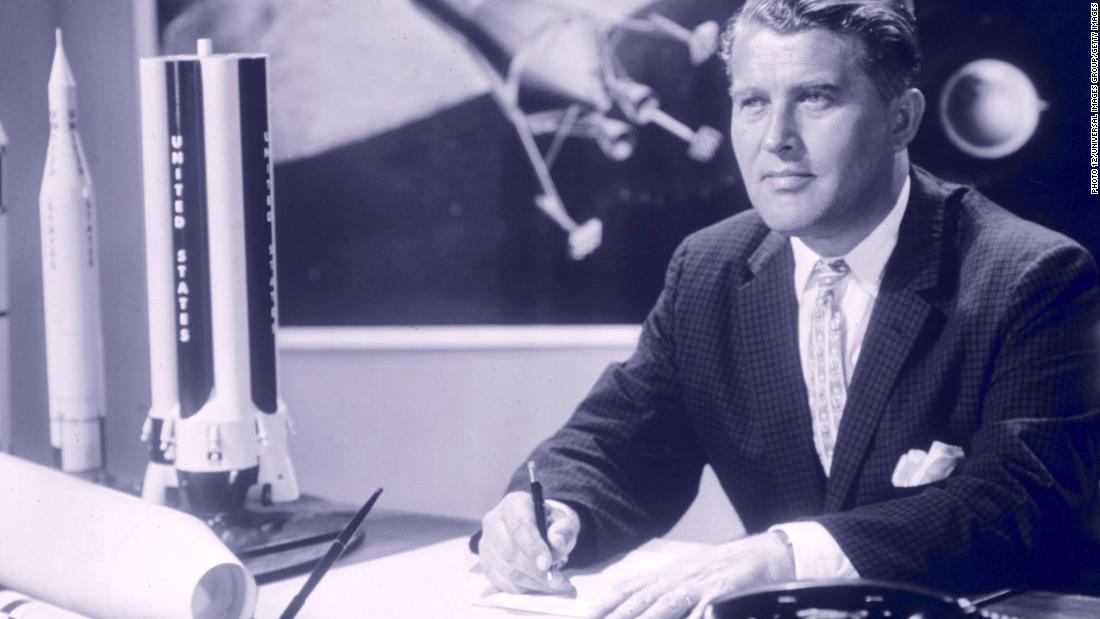Oddly, they both figure in a book I’m writing about Huntsville, Alabama, and its history as a hub of the Cold War space race — El Paso and Dayton were the main locales where the US government secretly installed the Third Reich aeronautics and missile whizzes “procured” right after World War II under a so-called “exploitation” program later codenamed Paperclip.
By the time von Braun’s rocket team propelled Apollo 11 to the moon in 1969, the team members moved to Huntsville and completed their transformation from death-dealing agents of fascist totalitarianism to gleaming American Cold Warriors and redeemers of the Free World.
And therein lies the key to what, beyond a geographical coincidence, links postwar El Paso to our contemporary political landscape: a rather circuitous line from the rehabilitation of Nazis back then to the restoration of an Aryan mindset that now goes by the name white nationalism.
When the US government first imported that Paperclip war booty, it at least had the compunction to keep “
our Germans” under wraps until pressured to unveil them at the end of 1946.
The New York Times’s
December 4, 1946, story from Wright Field signaled some distaste for the stage-managed debut with the dateline “Nov. 19 (Delayed for clearance by War Dept).” But the press generally accepted the Army’s casual accounting of the Paperclippers’ Nazi records, such that the Times reporter wrote, “Some were former Nazi party men and others were victims of the Nazi party,” as if that got the group to moral-neutral.
Protests against the program came from eminences including Albert Einstein, the minister Norman Vincent Peale, and Rabbi Stephen Wise, who had helped force the government’s first war-time acknowledgment of the Holocaust in progress.
But
while condemning these “potentially dangerous carriers of racial and religious hatred,” even they acknowledged that it might be “deemed imperative to utilize these individuals in this country.” The government protected von Braun’s fixer, Herbert Axster, an expendable lawyer rather than an engineer,
who was, per his Paperclip dossier, “a notorious supporter and profiteer of the Nazi Regime.”
For even those with disqualifying records were safe once the name of the game went from “exploitation” to “denial”—that is, denying these intellectual trophies to the Russians, who, you know, had no scruples and didn’t care whether “
their Germans” were Nazis or not.
Von Braun —
an “opportunist” party member, whose commission in the SS was apparently part of the “Reichsfuehrer-SS” Heinrich Himmler’s plan to seize control of the V-2 — became not only an American citizen (along with the rest of his team) but a pop culture celebrity, Walt Disney’s
ambassador of spaceflight on primetime TV.
By the time he restored the prestige of the Western world
in January 1958 with a satellite of America’s own to answer the Soviet Sputnik, there would be no reconsideration of his status as a first-class American. In 1960 the Joint Chiefs of Staff squelched a request to declassify his secret Paperclip dossier, with its early evaluation of him as a “potential security threat.”
Probably we would not have gotten to the moon ahead of the Russians without von Braun, who not only built the hardware but fostered the cultural and political will that fetched the Apollo program its prodigious funding. And conceivably Apollo would not have come about if the government had taken a harder line on his team’s Nazi past — the German-American who ran the Cape Canaveral launch operations,
Kurt Debus, had been a true-believing Nazi who
denounced a colleague to the Gestapo in 1942.
The moral cost-benefit analysis of Paperclip is not a simple one — say what you will, those “Aryans” did end up enabling us to escape gravity in the name of world peace. Today’s official eye-winking at “white nationalism” serves not science or discovery or even geopolitical imperatives but the reality-show aspirations of a professional fabulist.
It is the height of poignancy to read a military intelligence report on Fort Bliss from 1947, when there were concerns about the lax security that allowed the self-described “prisoners of peace” to cross the border to party in Juarez.
“El Paso itself is almost one half Mexican in population and very cosmopolitan,” an Army major-author writes matter-of-factly, noting that it is flooded with international as well as American tourists. “The general atmosphere of El Paso and vicinity is rather hospitable and easy-going, as might be expected in a growing city largely devoted to tourists and visitors. In this it does not differ greatly from most Southwestern cities.” This is the region — the region of our authentic, diverse “nationalism” — that our President
represents as a war zone.
The message of El Paso, historic and present, is this: In the America construed by some as “great,” if you are a white man there is almost nothing — whether it’s inventing weapons of mass destruction for a genocidal monster or
smirking at a proposal of human slaughter, grabbing women wherever, and notionally shooting someone in the middle of Fifth Avenue — that should be an impediment to power and glory. And if you are not, even if your Latino family has been in this country for generations, you may be cast as an aggressor mounting an “invasion” (a term Trump’s Facebook ads
have used over 2,000 times) and gunned down in an El Paso Walmart.
Once upon a time in El Paso, the country’s immigration challenge was to morally justify harboring Nazis by claiming that the Russians made us do it. Today, the Russians receive little resistance from the political gene pool that claims patriotism as its defining DNA. Conservatives used to exploit whiteness behind the cloak of a coherent ideology weaving personal moral responsibility and public fiscal responsibility. Today too many of them stand as naked as the emperor they fear to cross, courting American carnage.



